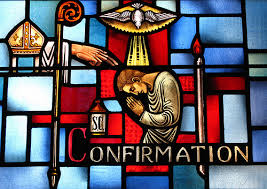Peter said to them, “Repent, and be baptized every one of you in the name of Jesus Christ so that your sins may be forgiven; and you will receive the gift of the Holy Spirit.” [Acts 2:38, NRSV]
Confirmation is an important event amongst Catholics, as the celebration is a rite of passage to Christian maturity.
And yet, to theologians, Confirmation is often dubbed “a sacrament in search of a theology”. Why? Amongst the different Christian Churches, the majority do not consider Confirmation as a sacrament. Questions such as these are often raised: “Why do we need such a sacrament at all? What is it all about anyway? Is there any basis for calling it a sacrament?…” The list of disapproving statements and questions goes on.
No wonder when a middle-aged Catholic was asked to help out in the parish catechetical team to prepare Catholic school students for Confirmation, he came straight to us seeking appropriate literature to read and asking about topics and questions suitable for discussion with his charge of confirmands.
There are of course many points on which the confirmands may appreciate clarification. What we shall do here is to briefly address three questions, amongst many others, which over the years we have heard raised by young Catholics preparing for Confirmation.
[1] Is Confirmation a Catholic invention with no basis in Scriptures?
Spurred by the Protestant emphasis on the Bible as the only authentic source for Christian teachings and discipline, the first question commonly asked is whether the very “Catholic” sacrament of Confirmation has any Biblical basis at all?
The answer is a resounding “Yes”.
When we look closely at the historical growth of the ancient church, we cannot fail to see that as the early faith community grew in numbers and spread in geographical locations, it became increasingly impossible for the early apostles to personally attend to the baptism of new converts. The danger was soon apparent that new converts baptized in diverse locales could lose a sense of connection with the apostles and the crucial sense of belonging to “one Church”. Thus the practice soon grew that the apostles would, at a later time after the new converts had been baptised, visit them and lay hands on them. Let us be clear. We are not claiming that the present-day practice of administering a separate, autonomous, sacrament of Confirmation is a precise duplication of the practice in the ancient Church. Indeed, that is not the case. What we do insist, however, is that Scripture does attest to a definitive scriptural warrant for distinguishing the bestowal of the Holy Spirit through water-baptism conducted by one who was not an apostle and, later, the subsequent “laying on of hands” by one who was. Hence, it is legitimate to claim, and the Catholic Church does so claim, that the origins of the present-day practice concerning Confirmation as a separate sacrament may be traced to the New Testament. Acts 19:1-7 and Acts 8:14-17, amongst other references, are germane to this question.
- In both these readings, we see that even though baptism had been administered to those Christians, the apostles had to visit them afterwards to, as it were, unlock the power of the Holy Spirit by laying on of hands on them.
- Confirmation is therefore best understood as a Sacrament of mature Christian commitment and a deepening of baptismal gifts. While it is most often associated with the gifts of the Holy Spirit, the best way to appreciate the matter is to see Confirmation as an unlocking of those gifts and thus of empowering the confirmands to flourish in Christian discipline, to bear witness to the Gospel-values of Christ.
[2] Since I was already given the Holy Spirit at the time of Baptism, why do I need to undergo Confirmation just to receive the Holy Spirit again?
The sacrament of Confirmation is conferred through “anointing with chrism on the forehead, which is done by the laying on of the hand, and through the words: Be sealed with the Gift of the Holy Spirit” (Catechism of the Catholic Church, # 1300].
We may see from this prayer and the anointing that precedes it, that there is something genuinely different from the water-baptism. Of course, we must accept that Baptism does confer the Holy Spirit. What Confirmation does is not to confer the Spirit again, but to strengthen the working of the Holy Spirit in the person. You might indeed see Confirmation as making one a soldier of Christ, doing battle with evil and insisting on walking with Christ in the light. It is the sacrament of strengthening one for living out the Christian discipline, so that one may begin to consciously bear witness to the love and lordship of Christ.
In the Old Testament, anointing signified healing, purification and strengthening, but most of all empowerment. Aaron was anointed high priest (Leviticus 8:12); Samuel anointed Saul and David as kings (1 Sam 10:1; 16:13f); and Isaiah was anointed prophet (Isa 61:1).
In the New Testament, Christ is the “Anointed One”, perfectly fulfilling through the power of the Holy Spirit the triple role of Prophet, Priest and Servant-King.
- Through Confirmation, then, Christians share more fully in Christ’s prophetic, kingly, and priestly roles.
- With the laying on of hands, therefore, Christians are claimed by Christ as his own, and empowered by the Holy Spirit to spread the Gospel by word and deed, and thus build up Christ’s Body, the Church.
[3] What then is expected of me after Confirmation?
Confirmation, by its very term, acknowledges that this Christian has matured, has come of age both in the comprehension of the faith and in being ready to move into the next phase of Christian living which is to seriously live out the disciplinary demands of Christian discipleship.
Christianity is first and foremost a story and a practice, rather than a doctrine and a law. It is the story of Jesus of Nazareth and the salvation history of the followers who come after him, and it is a life-practice which is in every way Kingdom-focused and Kingdom-related [“Seek ye first the Kingdom of God…].
- Kingdom values were what Jesus preached from one mountain [The Sermon on the Mount in Matthew 5-7], and lived to the full on the other mountain [death by crucifixion on Mount Calvary] in perfect freedom, integrity and authenticity on the one hand, and in solidarity and co-humanity on the other.
- He, who is indeed the Way, the Truth, and the Life has, through his life and his death, witnessed to the feasibility of all people who call themselves His followers to live the Gospel-ideals of loving God and loving neighbours.
- This is joyfully making personal sacrifices in Kingdom-advancement “on earth as it is in heaven”.
When we have finally come to realize what an honour it is to be Christians, to call ourselves disciples of Jesus who is the Christ, we realize too that truly, we are members of a noble “tribe”. The will of God for His Son, as it is for all his adopted sons and daughters, is to live a beautiful and noble life, in authentic freedom, and in conscious shared humanity. Christianity’s aim ought to be to help every human person to become the best human being he or she possibly can – as a child of the Creator-God. We are speaking about a beautiful and noble life indeed, for all. And that was what the Lord Jesus showed in his entire life-message. Nobility, He has shown, obliges: to whom much is given, much is demanded [Luke 12:48]. We have been given custody of the Word of God and we have received the message of salvation. We have encountered the Prince of Peace, and experienced His life of compassion and mercy. We must speak in words that are proportionately matched by deeds, genuinely loving God and neighbours. Confirmed Catholics strive to keep the inspiring words of Prophet Micah on the three things that the Lord God requires of each one of us: to act justly, to love kindly, and to walk humbly with God [Micah 6:8].
Copyright © Dr. Jeffrey & Angie Goh, November 2016. All rights reserved.
You are most welcome to respond to this post. Email your comments to jeffangiegoh@gmail.com. You can also be dialogue partners in this Ephphatha Coffee-Corner Ministry by sending us questions for discussion.


